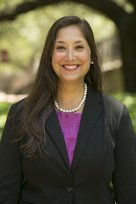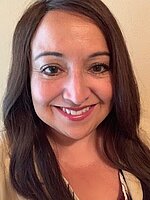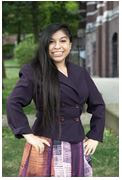
Melissa A. Martinez, Texas State University
A new year is often accompanied by reflection and hope. We reflect on our decisions, experiences, triumphs and challenges from the previous year, and look to the new year with hope that it will bring with it new adventures and opportunities to learn and grow. As such, we also often set new intentions based on lessons learned and goals for the future. Perhaps it is even more appropriate to reflect and find hope for the future in January, the month in which we honor the life and legacy of Dr. Martin Luther King Jr. It is with the spirit of the new year and with inspiration from the life and work of Dr. King that I write this blog introducing myself, Melissa A. Martinez, as the incoming Chair of Division A’s Equity, Inclusion, and Action (EIA) committee for 2017.
The past year has truly provided an opportunity for great reflection on my own role as a scholar of color, as someone who identifies as a cisgender Latina from the South Texas Border and engages in equity-oriented scholarship in the field of educational leadership. The increasing number of violent acts committed against individuals based on difference, and the 2016 presidential campaign season in particular, evoked tension, anxiety, and many fears about the future of our country and the direction we are headed. Such fears rose to a head on many university campuses, including my own, where students felt emboldened to spew hate through racist, homophobic, and xenophobic remarks and threats targeting not only students but also university leaders who engage in diversity work. I immediately realized how I, as well as many other colleagues on my campus, fall into this latter category; my web page clearly lists my research interests that include issues of equity and access, race/ethnicity, and social justice leadership. My anxiety at the time was only exacerbated knowing that the public university I work at is mandated to abide by Texas’ campus carry policy.
Yet despite my fears and amidst the continued political tensions that were polarizing our country and inciting violence in some cases, I found hope and solidarity in the words and actions of colleagues, educators, and students nationwide. More than ever before, I saw faculty colleagues across Division A utilizing Facebook, Twitter, and other media outlets to support each other during this difficult time, to get involved in efforts to combat hatred and inequities, and to organize protests, town hall meetings, and informative workshops on their own university campuses and in their communities. Students on my campus, and many others across the country, were similarly engaging in social justice work and making their voices heard through protests and petitions. Current and former students of mine who are educators and leaders in K-12 settings were equally engaged, inquiring about and exchanging resources to ensure thoughtful and supportive conversations about these issues in their schools and districts. This level of engagement against injustice reflects the indisputable fact that we are all connected, a reality that is captured in this memorable quote from Dr. Martin Luther King Jr.’s 1963 letter from Birmingham jail: “Injustice anywhere is a threat to justice everywhere. We are caught in an inescapable network of mutuality, tied in a single garment of destiny. Whatever affects one directly, affects all indirectly.”
As educational leaders we play a critical role in continuing the fight towards equity and social justice in these troubling times, and many discussions and presentations at the UCEA Conference in November reiterated this role and included a call to action. This message came across loud and clear in Dr. Monica Byrne-Jimenez’s Presidential Address, “Leading in dangerous times: Leadership as an act of love.” The Equity, Inclusion, and Action Committee recognizes the urgent need to continue such conversations and efforts during our upcoming 2017 AERA Conference in San Antonio where we will have two invited sessions this year: 1) Early & Mid-Career Mentoring for Equity-Focused Faculty: Insights from Senior Scholars on Navigating the Pathways of Academia, and 2) Building a Wall of Resistance through Critical Solidarities: Attending to our Personal and Professional Needs and that of Others in the Current Political Climate.
For the first session we have invited four esteemed senior scholar-administrators (Michael Dantley from Miami University, Frank Hernandez from Southern Methodist University, Judy Alston from Ashland University, Susan Faircloth from University of North Carolina Wilmington) who will share their insights about advancing research and leadership agendas that promote educational equity and enact social justice. Attendees will have the opportunity to participate in round table dialogues with senior scholars to discuss ideas and needs in separate early career and mid-career mentoring conversations. This interactive session is part of an ongoing mentoring initiative to lend equity-oriented faculty in educational leadership, administration and/or organizations valuable mentorship opportunities outside of their academic institutions.
The second session will be interactive as well and focus on how scholar-activists (can) address the current and recurrent violence and tensions in our society related to race, gender, LGBTQ, and other equity issues in light of the current political climate. The session will incorporate individual, small-group, and large-group dialogue and reflection to consider how we have been personally and professionally impacted by the current political climate, what it will take to ensure the needs of our disenfranchised are met, and how we can empower others and each other through our work and build coalitions to reach a state of synergy that will ensure progress towards equity and social justice.
The Equity, Inclusion, and Action Committee invites all Division A members to attend these sessions, which will undoubtedly spur critical conversation, encourage reflection, and provide a space for hope. In closing, I would like to take the opportunity to thank Dr. Ann Ishimaru for her leadership in chairing the Equity, Inclusion, and Action (EIA) Committee this year and Dr. Dana Thompson Dorsey, who has accepted the position of Co-Chair for 2017. I look forward to working with the EIA Committee and continuing in the footsteps of those who came before us.


 RSS Feed
RSS Feed